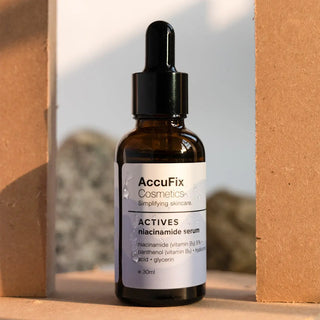Niacinamide has seen its popularity surge in recent years. It’s a form of vitamin B3 or nicotinic acid that has many benefits for the skin. Today we’re going to jump right into some of the most frequently asked questions about this fantastic ingredient and by extension, about one of our latest launches that feature it: our Serum Vitamin C, Niacinamide, Alpha Arbutin and Crème B3-B5-E.


For those who aren’t already aware, our Serum Vitamin C, Niacinamide, Alpha Arbutin is formulated with 10% sodium ascorbyl phosphate, 4% niacinamide and 2% alpha arbutin alongside bearberry and mulberry extracts, while our Crème B3-B5-E is a moisturiser that contains 4% niacinamide alongside vitamin B5 and vitamin E.
What does niacinamide do?
Niacinamide is a form of vitamin B3 that has been used in dermatology for over four decades for many conditions including acne, rosacea, and skin ageing. Since it is water-soluble, it is not stored in the body and needs to be replenished everyday. It plays a key role in the process by which our cells convert glucose to energy and is also essential for DNA repair and healing. It is safe for use during pregnancy.
What are the benefits of topical niacinamide?
Niacinamide has a lot of benefits.
-
Niacinamide, like vitamin C, is an antioxidant. Antioxidants are molecules that help destroy compounds called free radicals in your body. This is essential since high levels of free radicals can damage cells and have been linked to many diseases, including cancer. This property of niacinamide isn’t just useful for your body, it's also useful for your skin. Environmental stressors like pollution and UV rays generate free radicals that damage skin cells. Niacinamide helps to kill these off and thereby, minimise the damage they do.
-
Niacinamide also helps boost the skin’s barrier function by boosting ceramide, free fatty acid and cholesterol synthesis. In simple words this means that niacinamide helps make your skin less sensitive and prone to redness and more resilient in the face of irritants and environmental stressors. This makes niacinamide, at lower concentrations, a good ingredient to try for people prone to eczema or rosacea.
-
Niacinamide has also been shown to be beneficial for hyperpigmentation and brightening the skin tone.
-
Lastly, it also helps combat the signs of ageing including fine lines and wrinkles, and yellowness (sallowness), and it helps improve skin elasticity.
How should we incorporate niacinamide into our skincare routine?
Niacinamide can be used by pretty much everyone, morning and night. Using Crème B-B5-E is an easy way for anyone to incorporate niacinamide into their skincare routine. Serum Vitamin C, Niacinamide, Alpha Arbutin is more potent and exceptionally beneficial for those wanting greater skin brightening, anti-ageing, or pigmentation fighting benefits. The latter is especially beneficial for those looking to fight pigmentation since it contains a cocktail of 5 ingredients that help to combat it.
Why did we formulate Crème B3-B5-E with 4% niacinamide and not the usual 10%?
We wanted to bring you the benefits of niacinamide in a format that’s easy to use and incorporate into your skincare routine, and is suitable for all skin types, including those with acne, fungal acne and sensitive skin, so we created Crème B3-B5-E, a lightweight moisturiser that combines 4% niacinamide with panthenol or provitamin B5 and vitamin E to provide the skin with hydration, healing and antioxidant support. We’ve formulated with 4% niacinamide since multiple studies have shown that niacinamide is effective above concentrations of 2% but a lot of consumers report experiencing irritation at the high concentrations typically available in the market. This concentration results in a product that is effective, and is also better tolerated by a wider variety of people.
Can vitamin C and niacinamide be used together?
A lot of popular skincare blogs, and unfortunately, even some dermatologists will tell you that these two star ingredients in skincare can’t be used together. This is a myth however, and it is perfectly safe to combine the two. This myth stems from the fact that when niacinamide is combined with low-pH ascorbic acid, it converts to nicotinic acid, which causes the skin to flush, but still does give the skincare benefits associated with niacinamide. While this flushing of the skin isn’t particularly desirable, it isn’t harmful. In our Serum Vitamin C, Niacinamide, Alpha Arbutin however, we’ve used SAP which doesn’t need a very low pH to be stable, so this concern is avoided entirely.
That’s it for now guys! We hope you found this blog useful. If you have more questions about niacinamide, drop them in the comments below or WhatsApp us and we’ll get back to you. Until next time!

